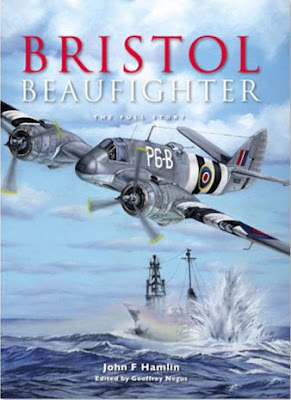
There I was sitting at my local cafe, kids-back-at-school celebratory coffee and book session delayed by one day, when I get a phone call from the post office to say I had a parcel that had somehow missed the day’s delivery. A short walk and 4.5 kg of Air-Britain magic was in my hands. Flintham’s Truculent Tribes bargain and the 2022 Propliner were incidental to the real reason for the order: John Hamlin’s Bristol Beaufighter made up most of the weight, 420+ pages of glossy A4 hardback goodness to be exact.
It is a beautiful book and is loaded with superb photos, all magnificently reproduced on quality paper and leaving few aspects, if any, of the aircraft to the imagination. There is a surprising amount of colour too, from ‘sidebars’ to period advertisements and a great number of clean profiles that feature some of the rarer markings seen on Beaufighters.
I am not an Air-Britain aficionado or member. While I love all aviation to varying degrees, my focus is fairly obvious, so I’ve never been able to justify membership of an organisation with a much broader (and understandable) remit. The few A-B books I’ve seen – Hamlin’s earlier Flat Out, the history of No. 30 Squadron, for example, was bought secondhand – are unsurpassed on the quality front, but I’ve never been one for lists of serial numbers, as useful as they are for regular referencing. The 240 pages of Beaufighter serials, a la Morgan and Shacklady’s Spitfire: The History (but on far superior paper stock!), are the raison d’être of this book and clearly the product of years of work. That’s a big chunk of an expensive book. What’s left is roughly 20 pages of the type’s development, including a column and a half on the Australian production line, ten pages of an ‘Operational overview’ and then a comprehensive 100 pages of potted histories of the units (squadrons, wings, OTUs, etc.) and air forces that flew the Beaufighter, which is effectively a longer ‘operational overview’. The appendices are also of interest, but everything outside of the serials section is all too brief.
The unit listing is impressive and there’s some fascinating inclusions, although the South Africans deserved more than two pages, despite only having the two units. Happily, the Royal Australian Air Force – squadrons and support units – gets a decent ten pages, the USAAF five and everyone else (France, Turkey, Portugal, Israel and the Dominican Republic) seven. However, again, it’s all in overview territory. There’s little more than the occasional one-liner quote from aircrew, but that’s perhaps a rabbit hole the author didn’t want to/couldn’t go down.
Speaking of the personal connection, there is a sobering tribute in the later pages dedicated to those who became casualties while serving with a Beaufighter unit (killed, wounded/injured, prisoners, etc.). Three columns per A4 page for 20 pages. It is a lovely inclusion. Imagine, though, the power of including the words of some of those listed or their contemporaries – giving them a voice. It would have made for a much longer book, of course, or a mighty second volume, but perhaps this is one of the few paths A-B rarely treads (if at all).
The Beaufighter’s full story continues to this day with long-term restorations to flight underway and great work being done on Hercules engineering in Queensland, Australia. Coupled with recent wreck discoveries, and even the important recovery of crew remains over the years, it is clear the type’s history did not end when the last airframe left military service. Again, the inclusion of such material was probably beyond the parameters the author was required to work within but would have highlighted the present stature of the Beaufighter in today’s historic aviation community and its exciting future. Extend that to a survey of the few surviving examples and the story is (more) complete. All this present-day material is, granted, nice to have.
It’s a Beaufighter book and that’s why I now own a copy and, if you’re a fan, you should too. It is good, but it is not the comprehensive treatment expected. I wanted more, what it says on the tin, ‘The Full Story’. It is an expensive book and will be a standard reference, though the cost needs to be weighed with what the reader is after. It’s more than just a serial number listing, and there are some gems throughout, but if you’re after an in-depth narrative on the type, how it influenced strike operations, what it was like to live with and fly, this is not the book for you. Indeed, there’s still not one book that can do that (but have a look for Neville Parnell’s Beaufighters over the Pacific, Graeme Gibson’s forthcoming Road to Glory, Athol Sutherland Brown’s Silently into the Midst of Things, and anything relevant by the great Roy Conyers Nesbit, to name a few). It is, however, certainly the most significant overall Beaufighter title since Chaz Bowyers’s 1970s/80s works.
Discover more from reviewer4you.com
Subscribe to get the latest posts to your email.






